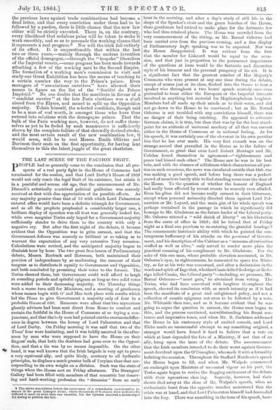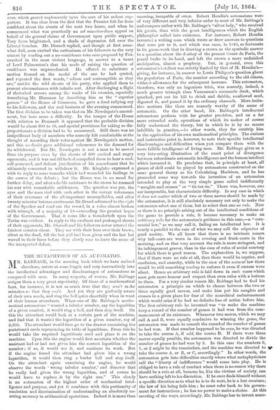THE LAST SCENE OF THE FACTION FIGHT.
PEOPLE had so generally come to the conclusion that all pro- spects of a real party fight in the House of Commons had terminated for the session, and that Lord Derby's House of 1859 would not only reach the legal limit of its existence, but attain it in a peadeful and serene old age, that the announcement of Mr. Disraeli's artistically contrived political guillotine was scarcely received at first with due appreciation of its possible effects. As any majority greater than that of 13 with which Lord Palmerston entered office would have been a definite triumph for Government, and as all the prophets prophesied a considerably larger one, a brilliant display of speeches was all that was generally looked for, while even sanguine Tories only hoped for a Government majority sufficiently slender to drive them to the country with only a negative cry. But after the first night of the debate, it became evident that the Opposition was in grim earnest, and that the Government defence was scarcely so brilliant or so taking as to warrant the expectation of any very extensive Tory secession. Calculations were revised, and the anticipated majority began to diminish hour by hour. The two great free lances of Parliamentary debate, Messrs. Roebuck and Horsman, both maintained their position of independence by *so moderating the rancour of their tongues as to distribute it equally to Government and Opposition, and both concluded by promising their votes to the former. The Tories cheered them, but Government could well afford to laugh at sounding periods and spiteful epigram as long as two solid votes were added to their decreasing majority. On Thursday things took a worse turn still for Ministers, and a meeting of gentlemen whose names begin with 0' and Mac took place with results which led the Times to give Government a majority only of four in a probable House of 630. Rumours were afloat that two mysterious ghostly advisers had been sent direct from Rome to comfort and sustain the faithful in the House of Commons at so trying a con- juncture, and that the holy men had pointed outthe enormousdiffer- ence in degree between the heresy of Lord Palmerston and that of Lord Derby. On Friday morning it was said that two of the Times' four were hesitating, and it was boldly asserted in the after- noon by men who were supposed to have the House on their fingers' ends, that both the doubters had gone over to the Opposi- tion, and that a tie was by no means impossible. On the other hand, it was well known that the Irish brigade is very apt to prove a very equivocal ally, and quite likely, contrary to all hydraulic principles, to displace a much greater bulk of Toryism than that cor- responding to its own weight on a division. Such was the state of things when the House met on Friday afternoon. The Strangers' Gallery had been filled with members of that eccentric but deserv- ing and hard-working profession the "dummies" from an early 2 The above was written before the occurrence of a remarkable coiroboratire in- stance in the great Limoges strike, where thoueaude of workmen were undoubtedly suffered to meet on more than one occaaloo, but the Opinion received a conunoniqui for daring to publish the fact. hour in the morning, and after a day's study of still life in the shape of the Speaker's chair and the green benches of the House, these gentlemen had retired to make place for the fortunate few who had thus retained places. The House was crowded from the very commencement of the sitting, as Mr. Bernal Osborne had been carried over from the previous evening, and a fine display of Parliamentery buffo speaking was to be expected. Nor was the House disappointed. It was evident from the first that the member for Liskeard would be equal to the occa- sion, and that just in proportion to the paramount importance of the questions at issue would be the fantastic and discursive style of his humour and the personal pungency of his wit. It is. a significant fact that the greatest number of Her Majesty's. Commons who were present at any one time during the debate,. except of course just at its close, flocked into the House to hear a speaker who throughout a two hours' speech scarcely once even pretended to treat either the European or the Imperial interests involved as anything but material for Mephistophelean laughter. Members had all made up their minds as to their votes, and did not go down to the House to be convinced ; but as Mr. Bernal Osborne is not troubled with any convictions himself, there was no danger of their being catching. He appeared to advocate German claims, it is true, but then that was by far the best stand- point for an attitude of universal mockery of all that was earnest either in the House of Commons or in national feeling. As for his speech, it was certainly one of the cleverest in his own peculiar line that he has ever made. His very first remark was on the strange accord that prevailed in the House as to the failure of Government, so great that even Lord Robert Montagu and Mr, Cobden found themselves in agreement—" righteousness and peace had kissed each other." The House saw he was in his best. vein, and with the absence of selfishness which characterizes all par- ties on such occasions, the news was circulated outside that Osb ,rne was making a good speech, and before long there was a perfect crowd of members barely able to find standing room near the door of the House. To the question of whether the honour of England had really been affected by recent events he scarcely even alluded. Even his gibes did not become really earnest in their bitterness, except when personal animosity directed them against Lord Pal- merston or Mr. Layard, and the main gist of his whole speech was perhaps contained in the passage in which he significantly did homage to Mr. Gladstone as the future leader of the Liberal party. Mr. Osborne uttered a " wild shriek of liberty" on his liberation from the cares of office in 1858; did he intend that of Friday night as a final one previous to re-entering the grateful bondage ? The consummate histrionic ability with which he pointed the con- temptuous buffoonery of his attacks on the personnel of Govern- ment, and his description of the Cabinet as a " museum of curiosities stuffed as well as alive," only served to render more plain the practical meaning of his compliment to Mr. Gladstone. For the sake of this one man, whose probable elevation amounted, iu Mr. Osborne's eyes, to righteousness, he consented to spare the Minis- try, as far as his vote was concerned, and after a declaration in the words and spirit of Iago that, whether Cassio killed lioderigo or Rod e- rigo killed Cassie, the Liberal party"—including, we presume, Mr. Bernal Osborne—" must gain," he abstained from voting. The Tories, who had been convulsed with laughter throughout the speech, cheered its conclusion with as much intensity as if it had been the manifesto of a great and enlightened policy, and not a collection of caustic epigrams not even to be followed by a vote. Mr. Whiteside then rose, and as it became evident that he was going to argue the question in earnest, the House soon began to thin, and the process continued, notwithstanding his fluent sen- tences and impressive tones, and when Mr. B. Cochrane addressed the House in his customary style of excited conceit, and Lord Elcho made an unsuccessful attempt to say something original, a stranger would have found it hard to believe that a vote on which at least depended the fate of a Ministry, if not that of an ally, hung upon the issue of the debate. The announcement that the Irish members intended to do their worst against Govern- ment devolved upon the 0' Donoghue, who made it with a formality befitting the occasion. Throughout Sir Stafford Northcote's speech the House began to fill, and when Mr. Walpole commenced an onslaught upon Ministers of unwonted vigour on his part, the Tories again began to revive the flagging excitement of the debate with their uproarious thee. ing. Scarcely, however, had their shouts died away at the close of Mr. Walpole's speech, when an enthusiastic burst from the opposite benches announced that the crisis was at hand, and that Lord Palmerston himself had descended into the fray. There was something in the tone of his speech, how- ever, which grated unpleasantly upon the ears of his ardent sup- porters. It was clear from the first that the Premier felt far from confident about the events of the next two hours, and when he commenced what was practically an ad misericordiam appeal on behalf of the general claims of Government upon public support, Tory faces brightened, and a shade of depression fell over the Liberal benches. Mr. Disraeli replied, and though at first some- what dull, soon excited the enthusiasm of his followers to the very utmost by reading out a no-confidence vote once proposed by Fox, couched in the most violent language, in answer to a taunt of Lord Palmerston's that his mode of raising the question of confidence was unprecedented. He offered to substitute a motion framed on the model of the one he had quoted, and repeated the first words, odious and contemptible as they are," amidst the wild shouts of his party, who applied them to present circumstances with infinite zest. After discharging a flight of rhetorical arrows among the ranks of his enemies, especially transfixing Mr. Horsman by describing him as the " superior person" of the House of Commons, he gave a final rallying cry to his followers, and the real business of the evening commenced. The first division to be taken was that on Mr. Newdegate's amend- ment, but here arose a difficulty. In the temper of the House with relation to Denmark it appeared that the probable division would be about 600 to 10, and special provisions for taking so dis- proportionate a division had to be announced. Still there was no insignificant body of members who scarcely felt comfortable at the thought of recording their votes against Mr. Newdegate's motion, and this no doubt gave additional vehemence to the demand for its withdrawal. But Mr. Newdegatc is not a man to be moved from his purpose even by the shouts of 600 excited and angry opponents, and it was not till he had compelled them to hear a cool, self-possessed, and defiant justification of his amendment that he ultimately consented to withdraw it. Mr. Kinglake expressed a wish to reply to some remarks which had wounded his feelings in the course of the debate ; but the House was in no mood for further delay, and after a feeble resistance to the storm he resumed his seat with remarkable suddenness. The question was put, the ayes and the noes vied with each other in the savage vehemence of their utterance of the all-important monosyllables, and after twenty minutes' intense excitement Mr.Brand advanced to the right of the Speaker and read out the record, in a voice almost broken with triumph, of a majority of 18—exceeding the greatest hopes of the Government. That it came like a thunderbolt upon the Tories was evident. In reply to the exultant and prolonged shouts of their opponents, Mr. Disraeli and his followers never uttered the faintest counter-cheer. They sat with their hats over their brows, silent as the dead, till the laSt yell had been given and the last hat waved in their faces before they slowly rose to leave the scene of the unexpected defeat.































 Previous page
Previous page